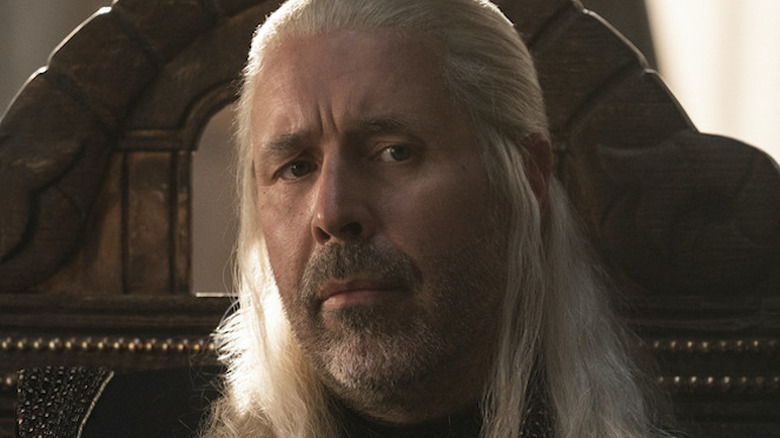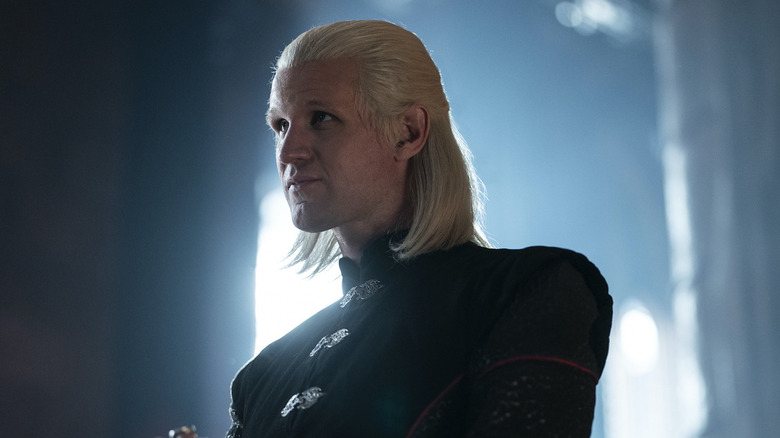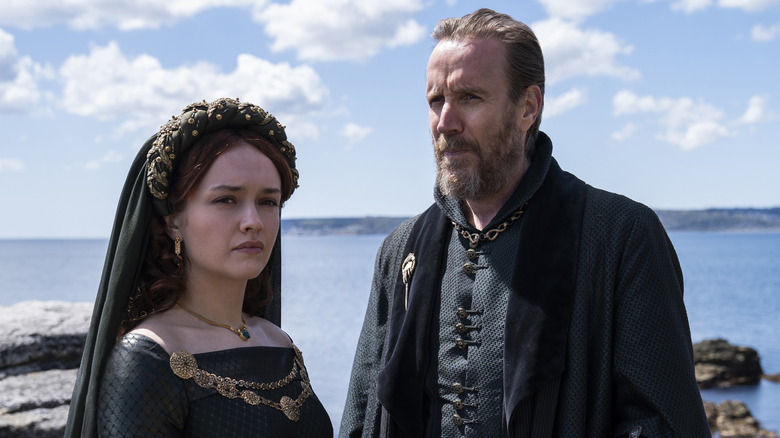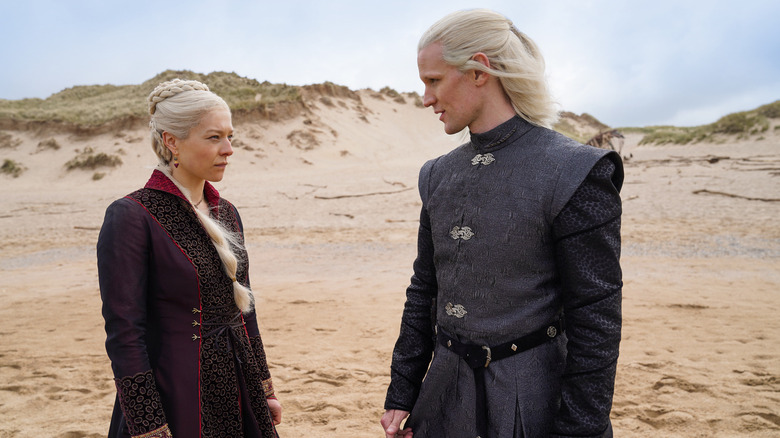HBO's House Of The Dragon Has A Major Problem, And It Isn't A Secret
HBO is enticing audiences to return to Westeros and the world of "Game of Thrones" with its upcoming prequel series "House of The Dragon," set to premiere on August 21. HBO's promotional material pitches the series as telling the story of House Targaryen centuries before Robert's Rebellion deposed the family from the Iron Throne and sent a young Daenerys Targaryen (Emilia Clarke) into hiding.
The series' teaser trailer reveals a brewing conflict between Prince Daemon Targaryen (Matt Smith) and Princess Rhaenyra Targaryen (Emma D'Arcy) concerning who will succeed King Viserys Targaryen (Paddy Considine), Prince Daemon's older brother. The Targaryens have seemingly already been in power in King's Landing for generations by the time this series kicks off, but the coming conflict will likely set the stage for the family's ultimate long-term demise. This central story is surely what HBO hopes helps fans warm up to the world of "Game of Thrones" again — but it also could be the chief reason this series does not succeed.
On one hand, different factions of the dragon-taming family breaking into violent conflict surely has the potential for the same level of suspense, action, and fiery conflict that "Game of Thrones" drew praise for. On the other hand, "House of the Dragon" is going to have a tough test ahead when it comes to getting past the sheer fact that audiences already know what's going to happen, lowering the shock and awe factor that "Game of Thrones" thrived on.
House of the Dragon faces the classic 'prequel problem'
In a world of IP-driven streaming wars, prequels have proven fertile ground for spin-off concepts ... but with varying results. No matter what shape a prequel takes, it has to work hard to justify its own existence because audiences already know where its story eventually leads. While HBO says "House of the Dragon" is set some 200 years before "Game of Thrones" starts, it's hard to ignore that whatever happens in this series eventually leads to Robert's Rebellion overthrowing the Mad King Aerys II Targaryen, as described heavily in the original series.
The new show promises to depict the history of the Targaryen family, but audiences already know all about it — because the original series weaved so much of Westeros' history into its own narrative. "Game of Thrones" grew into a pop culture phenomenon, in part, due to general audiences tuning into the show's reliably twisty and detailed conflicts week-to-week. While Martin's "A Song of Ice And Fire" was a popular fantasy book series before HBO adapted it to television, general audiences didn't know the ins and outs of the story at first, helping episodes like Season 3's "The Rains of Castemere" create all-time shocking moments for audiences.
That episode aired in 2013: nine years later, everyone who watched "Game of Thrones" knows the entire arc of the Targaryen family, if not the smaller details — not to mention that it all ends in the not-so-well-received finale of "Game of Thrones."
Though "House of the Dragon" brings a new chapter of Westeros' history to the screen, fans can't be surprised when Rhaenrya (Emma D'Arcy) and Daemon (Matt Smith) take up arms against one another.
House of the Dragon is based on flimsy source material
On one hand, the upside of "House of the Dragon" — unlike the improvised final stretch of "Game of Thrones" — has the advantage of having source material to work from. Martin's 2018 history novel "Fire & Blood" serves as the inspiration for the new prequel. However, that book is a far cry from the intricately-plotted novels that "Game of Thrones" originally relied on heavily for its story, creating a question of how ripe for adaptation the actual material in "Fire & Blood" is.
The first three "A Song of Ice And Fire" novels provided just about everything the first four seasons of "Game of Thrones" needed to achieve dazzling critical and popular success. But then, David Benioff and D.B. Weiss struggled when they had to start creating a majority of story themselves. That "House of the Dragon" is based on Martin's own work should be a positive sign, but the "Fire & Blood" novel isn't exactly loved like the other books in the series are.
When the book was released, The Guardian compared reading it to studying for a tedious exam. GQ's David Levesley called the novel a scam created by Martin as a means of avoiding actually finishing his original series. "Fire & Blood" is a fictional history book that merely fills in the gaps of the extensive backstories otherwise introduced in his actual epic fantasy series — the showrunners may find difficulty in drawing out 10 hours of compelling television from its pages.
A Targaryen civil war may not be as interesting as The War of the Five Kings
"House of the Dragon" promises to largely focus on a conflict that rises within House Targaryen itself regarding King Viserys Targaryen's (Paddy Considine) successor to the Iron Throne, but whether the series can retain the same sense of scale as "Game of Thrones" is up in the air. "Game of Thrones" features plot lines and characters spanning every region of Westeros — such as the wildlings who live north of the Wall, as well as characters and factions from the various cities Danaerys visits in her travels through the continent Essos — expanding with every season from the Starks vs. Lannister conflict to also involve the Greyjoys, Baratheons, Tyrells, Martells, Boltons, and more.
The "House of The Dragon" teaser indicates that the series will at least initially focus on the goings-on of King's Landing and the Red Keep to start. Intrigue in Westeros' capital city always provided enticing storylines in "Game of Thrones," but without the ability to take a break and meet a Stark or Martell in another part of the world, it's possible that following a smaller amount of characters all in the same location could reveal potentially thin writing more quickly than in a more epic storyline.
Ultimately, prequels best succeed when they create their own sandbox of an IP universe worth playing in — focusing on a new story rather than spending too much time setting up future plots that viewers have already seen. The whole world knows HBO has what it takes to make Westeros compelling — they just need to execute it effectively.



